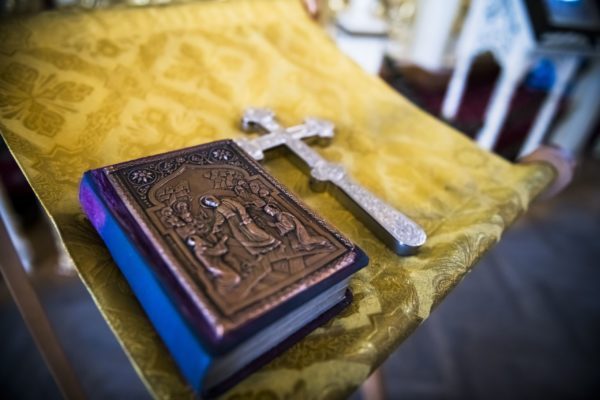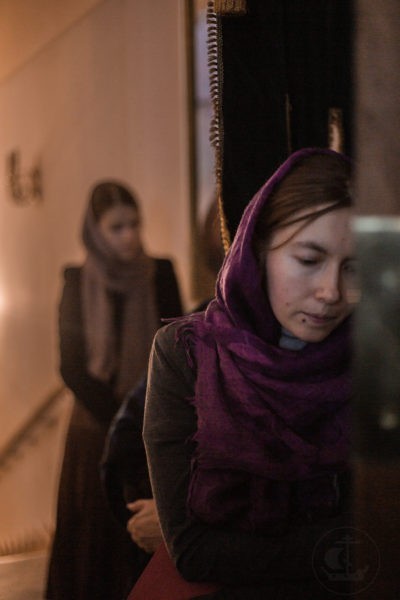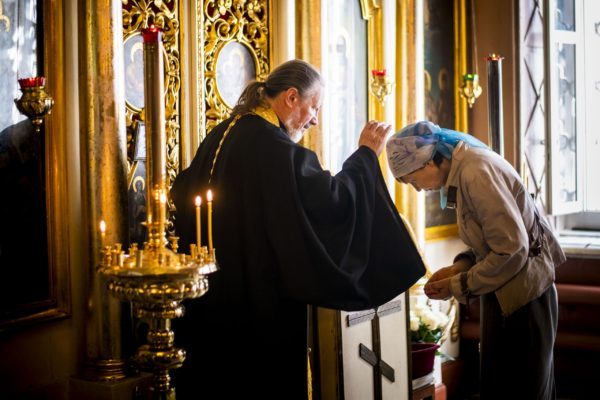“Today, people who have sincerely been in the Orthodox Church for many years, who used to participate in the Sacraments and submit to the traditional discipline, are leaving the church. How can it happen that a person who has been in Church for 30 years would no longer receive Communion? Some laymen come to spiritually outgrow experienced priests; what are these people offered? Why it is not right, as at the elementary school, to “sit them at the desk”, demanding to “raise a hand”? How is the Christian freedom of a mature person actually realized? Can a layman preach? How to answer the questions of people who require dialogue?” – A discussion by Archpriest Theodore Borodin.
The most difficult thing is to grow as a Christian in freedom
– Father Theodore, not only people who grew up in Church leave it, but also those who came to Church in a conscious age. Why does it happen?
– The reasons for leaving are interpreted differently by different people. For

Archpriest Theodore Borodin
example, Fr. Peter (Mescherinov) considers the main reason to be the fact that there is no relevant teaching for long-churched people.
Intellectually, I agree with him, but in substance, I don’t. First, I believe that the Principal Educator loves these people, and will never give up the struggle for them, even though the ways of His Providence are incomprehensible to us. Secondly, the colossal legacy of the Holy Fathers is precisely how to grow the Christian soul. Look at two thirds of Philokalia. There, only the form is monastic, while the teaching itself is common for everyone. Indeed, there is no separate “monastic Christianity.” Also, there can be no general teaching for mature Christians. Everything is so individual that this experience cannot be written down and published. If it were written, such “solid food” could harm those who, according to the Apostle Paul, still require milk (1 Cor. 3: 1). Christ himself calls one man to be a disciple, not allowing him to go to the funeral of his father, and then refuses another man who wants to go after Him. Christ is One, people are different. Fourthly, teaching, pedagogy is translated as guiding children. But what could be a common teaching for mature adults?
Yet Fr. Peter is right that the generally accepted practices of Church life that are considered obligatory are the same for all of us, and this practice was designed for newcomers. This is a huge problem.
We can describe a catechumen as a grade one elementary school student. He should be taught how to ask a question, how to raise his hand and how to write legibly. Obviously, such approaches are irrelevant for high school or university students.
At the same time, it turns out that for Orthodox Christians, there is one and only scheme for personal Church life, without any variations. There is one prayer rule— morning and evening—and only one way to prepare for the Holy Communion and one fasting system.
A man gradually increasing in faith enters into a very difficult contradiction with this lack of alternative. What is a prayer book? It’s a textbook offering beautiful patterns signed by great names of Saints, and the Church is confident in these prayers. A new man should be taught to pray so he comes to love this process. A beginner also needs to be taught asceticism to clarify that there is no Christianity without asceticism. He must gradually learn to see that sin destroys his soul. There is no need for a priest to tell a man who has been active in church for 15 years: “Do not watch this TV series,” it is necessary that the man comes to understand this himself.
It is important for people to be eager about spiritual reading, and the priest can only advise which books to read.
It is important to ignite in a person the desire of the Body and Blood of Christ, so that (s)he understands that (s)he cannot live without the sacrament, and the priest no longer needs to decide for them when they take Communion and when they don’t.
The most difficult thing in spiritual fatherhood is that a Christian must be raised in freedom. Freedom and the ability to properly use it (Gal. 5:13) are the most important qualities of a mature Christian. A priest is obliged to educate his parishioners in freedom, not ruling the people. But, as it happens in the upbringing of children, if you want to teach them to live rightly and independently, then as they grow, you must keep giving them space to make their own decisions, with all the ensuing consequences. There is no other way.
The latter, by the way, is very strongly resisted by many people who are in Church only recently: they want to shift the responsibility onto the priest. But the task of fatherhood is to ensure that our children live properly in our absence. St. John of the Ladder says that the true son is known in the absence of the father. And he says so specifically about spiritual fatherhood. If there is no freedom, it is fake Christianity.
Every Christian must pass a neophyte state, we well as a period of being “abandoned by God.” And, if after years in Church, a person is affirmed in a state of both joy and repentance, then there needs to be options.
– What options? Different kinds of spiritual effort?
– Yes, for example, prayer life. What is the morning and evening rule? This is a time to meet God at the beginning of the day and at the end of the day. What helps you meet God now? For someone, in each period of life, it would be the morning and evening rules from the prayer book; for someone else it would be reading the Gospel, for someone else the Jesus prayer, for someone else – just silence, or thanksgiving, or praise. In the end, all spiritual life, and prayer especially, offers great creativity, and creativity cannot be prescribed. Creativity is not only different for different people, but even the same person is creative in different ways at different stages of life.
With the preparation for Holy Communion, we seem to pose identical (and rather advanced) requirements for everyone. But we forget that there are well-known sufficient conditions for Holy Communion laid by the Church long ago – the right faith; the desire to partake of the Communion; the absence of serious unrepented sins; if possible, peace with everyone; a contrite heart; and finally, the Eucharistic fast (from Saturday midnight). Everything else is just a means to an end, and the means can change when they don’t work or become irrelevant.

Photo: tatmitropolia.ru
What I mean is this: Suppose an Olympics-level athlete and a boy who has been training for three months come to the same gym to train. They cannot be training in the same group. If the group is focused on the youngest, it will not give anything useful to the athlete, and the professional-level training style can be very damaging and even crippling to a beginning student. Yet with the Communion rule, it looks like we have only one ‘warm-up’ for all.
Really, a person who goes to Church for a long time is a person who has some prayer skill, and the willpower to instantly put himself in front of God and immediately feel when the Holy Spirit has departed from him and understand why it happened. Just like an Olympic athlete, always ready for battle, even without a warm-up.
Then we inevitably come to the question of Confession for these people. [In Russia, it is customary to come to Confession on Saturday or Sunday, before every Communion – A.S.]
I recently had a conversation with a dear friend who has been attending Church for almost thirty years. It turned out that this person had not received Communion for a long time. He said that in the parish next to his house, they do not allow Communion without Confession.
– Like most Russian parishes…
– Correct, like in this one, such a tradition has developed. Our conversation with that man took place on the Passion Week. And this friend, nevertheless walking up to the Confession stand, said to me with tears in his eyes: “In the face of this Man covered with blood, I cannot repent of having spent a little more time at the computer screen yesterday because I understand that I need to be killed.” A person is so deeply and correctly concerned that Christ died for him that he cannot bother about trifles.
Such people have a strict attitude toward themselves, the expectation of a true serous Confession, and they are not ready to go do it simply because it is required every time. They know how it happens when Confession transforms your soul and your life changes; this is the high standard that they demand from themselves. They want to take Communion frequently, but it is impossible to make such a Confession before every Communion. Moreover, the penitent heart is already their common state.
What do we offer to such people? I know many priests older than myself, whose spiritual experience I trust, and they solve this problem as follows. Some of them say that they allow such parishioners to just come under the absolution prayer. Some of them suggest coming to Confession in obedience to the Church and say: “I have sinned by deed, by word, and by thought.” Some priests allow parishioners they trust to take Communion without Confession because these people are already watching their souls.
The first two options are still very confusing to many people. After all, they hear: “Behold the child, Christ stands invisibly, accepting your Confession.” They feel that they must approach Christ and put on a theatrical performance.
They understand that the sacrament is the action of God, that Christ really stands here, and they are not ready for this theater; they cannot exchange their relationship with Christ for this.
It turns out that the tradition of Confession before the Communion is a burning question for such people; it hinders their Eucharistic life. And we are not going anywhere on this issue. We can continue to turn a blind eye to it but there are such people and they are growing in number. Some of them stop receiving Communion, and then they may not be far from leaving the Church altogether. This also happens because their mature souls most acutely experience the incorrectness of prayer at the Liturgy without Communion. It hurts them to be at the Eucharist and not to partake. And I feel the same when I do not take Communion at the Liturgy. Other priests feel the same way.
When a young priest is not respectful to old parishioners
– A document entitled “On the participation of the faithful in the Eucharist” was adopted [in the Russian church – A.S.] back in 2015. Why is there no change?
– This document and its discussion were a consolation to all of us, because perhaps for the first time since the Russian Church Council of 1917-1918, the whole Church community was so passionately discussing an issue important for everyone. In this case, it was the preparation for this sacrament. Thousands of responses were received, and many changes were made. This is wonderful!
However, even having adopted this document, we still pretend that the category of people I am talking about doesn’t exist. The document says that in some cases, a confessor can bless a layman to partake of the Body and Blood of Christ several times during one week (the Passion Week, the Holy Week, between the Nativity and the Theophany) without a Confession preceding every Communion. Why doesn’t this document say that a priest who has known a parishioner for many years can give a personal blessing to come to the Holy Chalice when their soul desires and come to Confession as needed, but no less than once in a certain period. For example, once a month. After all, this is how some local Churches live. Why is it possible for the Greeks today, but not the Russians?
The initial reasons are clear. In Greece, the traditional church life was never interrupted by atheism. There, people grow up and learn from their parents and confessors how to live a deep and responsible Eucharistic life. But in the 1990s and 2000s, in Russia, one couldn’t switch directly to that mode. The fact that by the 1990s we had a mandatory Confession before the Communion, in my opinion, is a clear action of the Holy Spirit. It was God’s Providence for the Church. It was precisely the Confession stand that became the point of churching, missionary work and an introduction to Church life for tens of thousands of non-Church people. We spent thousands and thousands of hours confessing, answering questions, and that was the only necessary and right way. But many of our parishioners have already passed this stage, they are no longer “first-graders,” not even “University students.” They are like graduate students and specialists. They live deep, saturated spiritual lives; sober and truthful.
If a priest is confident in a layman, he should be able to give a blessing to have Communion when the layman needs it. It is important for parishioners themselves to make such decisions. But, since our practice is one for all, some people bump into the wall. Many of them stop the Eucharistic life, and at the same time their lives in the Church ceases: there is no second without the first. We know what excommunication is: it is when a person is told that they cannot take Communion.
Indeed, catchumens need to be worked with, perhaps for 10 or 15 years. Sometimes people simply don’t know anything, and they may not understand the most important truths of the faith. Or they may have some wild ideas about Christianity, ideas with which one shouldn’t commune.
For example, a person can say at the confession: “Three weeks of Lent have now passed, and I haven’t committed adultery in this period, because it’s Lent. I want to receive Communion.” If I had not met this man, he would go to the Chalice, and after Pascha he would continue doing what he used to do before Lent. It is necessary for such a person to come to Confession first, so that we could talk…
But we are not talking about such people now. At this point of time, an amazing generation of wonderful, spiritually grown people has arisen – the people who love Christ and have attended Church for many years. Sometimes I freeze in admiration, thanking God that I am a priest when I stand as a witness in a conversation of such a loving soul with Christ, observing a person to whose measure I have not yet grown; a person with spiritual skills that I have not yet gathered in myself. And I understand that this brother or sister is further along in their spiritual life than I am. I have been appointed by God to perform the sacraments, but I have something to learn from this person.
– It is not common to hear this from a priest…
– Unfortunately, many priests believe that since they have received the rank, they know best; because they are leaders . The Holy Fathers say that through Christ we are adopted by the Heavenly Father and Jesus is our Brother. Abba Isaiah says: watch whether you act according to the old man or according to the nature of Jesus – our Brother.
A priest in the first place must remember that all parishioners are his brothers. Only hierarchically, he is given a special ministry, where God performs the Sacraments with the priest’s hands. This does not mean that a priest can treat people disrespectfully or boss them around. How many times have I seen a young priest address a parishioner who could be his mother and tell her: “I told you so, so it must be done. If you don’t obey me, you are disobeying God.” Well, this parishioner may be ten times closer to God than this young priest. First, we priests need to change this paradigm of relations.
Our attitude should be respectful—respecting the person and their freedom—their otherness.
Of course, Christians need to study their faith, learn the teachings of the Apostles and dwell on them daily for the rest of their lives. In the Book of Acts, we read about the first Christians: “And they continued steadfastly in the Apostles’ doctrine and fellowship, in the breaking of bread, and in prayers.” (Acts 2:42).
In our church life, we have mastered the breaking of bread – the Eucharist, as well as, to some extent, prayer. But the apostolic doctrine (that is, the doctrine of Christ and the fellowship, which is the life of the community), by which we must abide daily, is not very well understood. If the first Christians lived like that, why should we lose this? Note that “apostolic teaching” stands before “breaking of bread.” That is, a person learns the teaching of the Apostles, enters the community, and breaks bread with members of the community. He is not alone; he is among brothers and sisters who share his faith.
This apostolic teaching must be obligatory in the parishes. Last year, I realized that being busy with teaching children in our Sunday school for several years had somewhat moved away from my adult parishioners. So, we decided to read the Book of Acts on Sundays after the service. I prepared, looked for material and we discussed the passage that we read, trying to see through it the reality of the modern Church. And it turned out to be interesting to me and the parishioners: sometimes over 70 people showed up. It is important, necessary and interesting for the people to study the Word of God.
In studying the Word of God there is a mysterious act of God when He speaks to the soul of a Christian. We must have classes to study the Gospel, the Old Testament, the New Testament, have lectures, courses dedicated to the teaching of the Church, and so on. There is a variety of forms to choose from. Like in a family, if the husband and the wife do not speak heart to heart for years, they gradually become estranged. Similarly, without being nurtured with the Word of God or without a constant deepening in faith, a person can lose interest and leave.
In addition, teaching in the form of a sermon must be in place.
– Sermons by priests, or by laity as well?
The same Book of Acts tells how, after persecution, after the martyrdom of Archdeacon Stephen, Christians, not only apostles, began to preach the Word of God all over the world. Preaching the Word of God is the normal state of a Christian, in which they maintain their faith. A person constantly formulates it for themselves, clarifies and studies it. There is a certain mystery there: the fire of faith flames up when you share it. And when you keep it to yourself and don’t share it with anyone, perhaps there is some betrayal of the words of Christ who told us “Go, teach all the nations” (Matthew 29:19).
We don’t have a preaching culture, not even among the priests. Many of us cannot simply go out to interested, benevolent secular listeners and talk to them so that they can hear about Christ. Not to mention speaking competently when faced with skeptical and negative attitudes.
There is almost no culture of preaching by the laity either.
Since 1992, I went to several secondary schools and taught there what later became known as the “Basics of Orthodox Culture” school course. There were practically no children from church-going families there. At that point I understood very clearly that a sermon is an act of the Holy Spirit. If I pray for these children, if I ask God for help, that He may protect me from vanity, then it works out. In fact, this action of God can be carried out not necessarily through the sermon of a priest, but also through the sermon of a layman.
I myself came to faith through a layperson, my Godmother. I know for sure that the Holy Spirit, acting through a preacher, affirms and strengthens the faith of the preacher himself. We know how important the personality of the preacher is. He should demonstrate the kingdom of Christ of which he speaks in himself, in his own soul. This is precisely what experienced Christians can do better than others. After decades of Church life, they have something to show. But we don’t give them this opportunity, we are afraid, or don’t want to create these new formats because then one can’t control what a free adult person will say. Does their fire of faith get extinguished because we don’t let them share it?
The reasons are inside a person, outside are only the occasions
– You said that faith must be kept. Is this the process of keeping the faith?
– “I have fought the good fight, I have finished the race, I have kept the faith,” writes the Apostle Paul (2 Tim. 4:7). He says this, seeing his own approaching departure from this world. The former persecutor who was taken up to the Third Heaven, who saw the risen Christ, who became the foremost of the Apostles, and led the process of baptizing the pagan world needed to maintain his faith. He considers the victory in this challenge to be the main outcome of his life. From his words, we can understand that the preservation of faith is a life-long struggle for every believer. Otherwise one becomes an unbeliever.
The reason for the loss of faith, as well as its gain, is always inside a person: outside, there are only occasions. Most often, it may be a serious sin, or a passion incompatible with the Gospel. The same way there can be injuries incompatible with the life of the body, there are also injuries incompatible with the life of the soul. There are sins that, if a person agrees to live with them, inevitably remove him from the Communion, and then, expel him from the Church and kill his faith.

– It would seem that a person had met Christ in the Church, how then can one leave Him?
– In scripture and theology, the relationship between Christ and the human soul is often viewed through the image of the relationship between the bride and groom, or husband and wife. Our current statistics in Russia shows nine out of ten marriages end in divorce. Most of these people used to love each other, and they were sure their love would never die. But they failed to preserve their faith and their love for each other. Though now we are not talking about marriages, the mechanisms of losing love in the family and losing faith are similar.
Therefore, I cannot agree with the saying that if a person left the Church, they never really met Christ. I know some sincere, deep, and unfortunately, former Christians who completely lost their faith and left the Church.
But we should not despair and lose heart over it.
When a person in his youth first came into the temple, or opened the Gospel, or said the first prayer, and clearly saw the presence of Christ in his life, he met with Him face to face, and from that moment, the dialogue began. This is the love of two for each other: the soul of a man and the God-man Jesus Christ.
Love involves action and care from both sides. Therefore, let us remember that the Lord has taken this person under His care. As long as the person is alive, nothing is over.
I am sure that most of those people who renounced faith—after having bounced around in the worldly life— will see that there is nothing more beautiful and true than Christ in the world and come back. We see many young men and women who grew up in our Sunday schools in the 1990s return to church. In the 2000s, they left the Church, and now, when they are about 30 years old, many are coming back to the temple.
In the 1990s, dozens of old people who refused to believe in their youth, already on their deathbed returned to Christ with tears in their eyes. This is my testimony as a priest. I am sure that any priest in my generation or older has seen many cases like that. What a joy!
Why we need a living community in a parish
– Can the community life in a parish help a person stay in the Church?
– For people who are in Church for many years, it is hard to live without a community because community is in the nature of the Church (see Acts 2:42). It is the normal state of a parish when it is a family. If a person doesn’t find this, a dissonance develops over time. At the Last Supper with Christ, all the people who were there (except Judas) loved each other. If a person doesn’t find this in the parish something is wrong. The community must be cherished and built up.
– Is the community only about interaction between people (not counting the Main Person, of course)?
– It is important for a person to be included in the parish community’s activities. This may be the activity of mercy or the activity of preaching.
Someone can, for example, hang a shelf for another parishioner, a woman with small children abandoned by her husband. Someone can help a large family. Someone can take care of a sick old man. Someone can help cook meals for a large family for a couple days. Someone can help take a child to school if they live nearby.
Faith always means action and service. If we get locked in ourselves, we can lose the faith.
I generally believe that after a while, a person who has become a parishioner and has established at least some initial order within his soul, should start doing something for the sake of the Lord, free of charge. Once a month, once a week, once every two weeks – go to a nursing home, drive someone somewhere, help someone, sew for someone or help a child with homework. Choose what you can do well. And even if you earn a living by doing so, make a certain amount of your work free of charge, for the sake of the Lord, and be sure to do it systematically. A community where everyone interacts with each other gives a lot of opportunities for ministry.
Christian ministry is directly related to the preservation of the Christian faith. The Gospel testifies that the apostles fled in fear during the arrest of Christ, betrayed their Master and the women disciples did not. Why was that? How did their discipleship differ from that of the Apostles? They didn’t listen to Christ’s teaching as much. But they served Him with their skill and their hands; they cleaned and cooked. The Apostles mostly received, and when they stopped receiving, they fled. And the myrrh-bearing women gave through serving.
A Christian is not firm in faith until he begins practical works of charity, until he understands that he needs this service.
Perhaps those who left the Church did not have enough chances for such service in their parish? Maybe we failed to help organize it?
They will be back, we must just pray and wait
– Now, if a person has some serious questions about the faith and asks questions and hears in response: “Don’t philosophize, it’s a sin,” then what?
– This is as if we consider a person who graduated from a medical school, who is doing their residency, helping a famous surgeon, and we bring this person to an elementary school, first grade, and say: “Why are you asking questions without raising your hand?” This person would simply turn around and leave. They want to understand; not just believe.
Surprisingly, for the last three years, like other priests, I think I have been talking much more with people going to church for a long time than, say, 10 years ago. They have many questions that require dialogue. These questions did not arise before. But faith is a way. “The Way of the Lord” is the first self-identifying name of the Christian faith. This is the path which the One Who calls Himself the Way leads the soul that loves Him. Of course, the tasks, the trials and the questions become deeper and more complex from year to year. The priest himself might not have encountered the difficulties that are now burning for a parishioner.
I remember a conversation with one brother, a very gifted man, involved in diverse and successful Church activities. He once told me: “Father Theodore, for five years I have been praying as if into a concrete ceiling. There is no answer, never!” A burnout. There are tears in my eyes. A year later, I met him again: “All is good, it’s over. The Lord is near again!”
If a priest has similar experience himself, he would understand a parishioner whose path now lies through the desert of forsakenness. He would understand and console: “I was there. I survived and kept the faith. “
Mature Christians also need mature confessors, like in Greece, where only the most experienced priests are blessed to receive Confessions. But it is not possible here.
If a person, nevertheless, loses faith and starts asking crazy questions, if their heart decided to leave, then we must recall the parable of the Prodigal son. What did the father do when the youngest son came up to him with his ridiculous demands? He gave him a part of the estate. He did not talk to him; he knew that it would be useless. The young man who grew up in the care of his father will not appreciate or even hear anything at this point. The father lets him go, only praying and looking down the road. The prodigal son must get hungry, then recover, understanding what he had lost. And only then will he be adopted as a son.
This is also a stage of spiritual growth. There are people who will not become true Christians without this stage. The people who returned to the Church after trying everything, and understood, like the son from the parable, that there is no real beauty on Earth in comparison to the Father’s house, are real Christians. The Apostle Peter betrayed and was forgiven for only one reason: because Christ loves him. Having gone through this, Peter will never betray again.
In the meantime, such people, as adolescents in their transitional age, have completely rejected the Mother Church. They may even be in an apparent confrontation and rudeness toward Her.
But the Heavenly Father waits and believes.
I have a separate sheet with the names of young men and women who, in their childhood, or in their youth, grew up in our parish, but left. If they don’t blaspheme and don’t call themselves atheists, I continue to commemorate them at every Proskomedia. And I believe that they will return, though perhaps not to this specific temple.

Photo: tatmitropolia.ru
But we must pray for them all the same. This is also a struggle, and it is not over— God continues a fight for these people. After all, the father in the parable continued to love his prodigal son as much as the other one; he has his own care for each of them. And when, exhausted and having lost everything, the son comes to him, the father will still accept him as a son. God is not content with other relations with a man. He values every person too much; he loves them too much.
I’m sure many will return. You just need to pray for them and wait for them. We must prepare for their arrival and meet them with dignity. It is impossible to imagine that after such a meeting, a father begins to chastise his son for the fact that he didn’t dress properly or left his shoes in the wrong place.
——————
Translated by Alexey Shevyakov

















